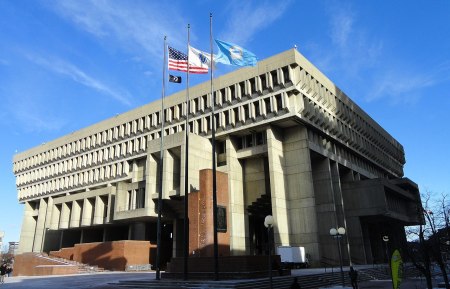Supreme Court asked to rule if Boston can legally refuse to fly Christian flag at city hall

A conservative Christian legal nonprofit has asked the U.S. Supreme Court to weigh whether the city of Boston violated the rights of a Christian organization by refusing to allow a Christian flag to fly on public property.
In 2017, an association called Camp Constitution sought to fly the Christian flag during a Constitution Day and Citizenship Day event at Boston’s City Hall. But the city denied the request.
This rejection came even though numerous other private groups had successfully applied to wave flags representing sovereigns countries and nonreligious causes.
The Liberty Counsel, a Florida-based organization that engages in litigation related to evangelical values, filed the petition with the nation's high court on Monday after a federal appeals court ruled against Camp Constitution in January. The legal group argues that other forms of religious imagery have been allowed at city hall in the past.
There are three 83-foot-tall flagpoles outside Boston City Hall, two of which always fly the U.S. flag and the state flag. The third usually flies the city flag, but citizens can petition to raise other flags temporarily. The appeal claims that between 2005 and 2007, the city has approved hundreds of requests to fly other flags with "no record of denial."
One example the petition cites is the City of Boston's flag, which is usually raised on one of the Flag Poles and depicts the City Seal. The seal contains the inscription "SICUT PATRIBUS, SIT DEUS NOBIS," which means "God be with us as he was with our fathers."
“The Turkish flag, which the City has approved at least thirteen times, in 2005, 2006, and 2009–2019, depicts the star and crescent of the Islamic Ottoman Empire," the filing explains.
The petition contends that Boston’s “denial of Camp Constitution’s flag-raising request violated Camp Constitution’s right to free speech under the First Amendment, as well as the Establishment Clause of the First Amendment and the Equal Protection Clause of the Fourteenth Amendment.”
Liberty Counsel Founder and Chairman Mat Staver said in a statement that he hopes that the Supreme Court will acknowledge “the city’s obvious and unconstitutional discrimination against Camp Constitution’s Christian viewpoint.”
“There is a crucial difference between government endorsement of religion and private speech, which government is bound to respect,” Staver said.
“Censoring religious viewpoints in a public forum where secular viewpoints are permitted is unconstitutional and this must stop.”
In February 2020, U.S. District Court Judge Denise Casper, an Obama nominee, issued an order against Camp Constitution and its leader, Harold Shurtleff. The judge reasoned that the city hall flagpoles constituted “government speech” and not private expression, thus making a Christian flag an unlawful government endorsement of religion.
“There are no additional facts in the record that would suggest any improper preference for non-religion over religion or selective treatment of any person or group based on religion,” concluded Casper.
“The City did not alter its procedures for review of flag applications because of Camp Constitution’s request, instead, Camp Constitution’s request presented a novel issue for the City’s consideration, which the City considered consistent with its practice and policy.”
A three-judge panel of the U.S. Court of Appeals for the First Circuit upheld the lower court ruling in January. Judge Bruce Selya, a Reagan nominee, authored the unanimous opinion.
Selya argued that the flag display would constitute government speech since it would be flown alongside two other flags representing the United States and Massachusetts.
In deciding which flags could be on the third flag pole of the city hall display, the court found that the city is not bound to treat the third flagpole as private speech protected by the First Amendment.
“Here, the three flags are meant to be — and in fact are — viewed together. The sky-high City Hall display of three flags flying in close proximity communicates the symbolic unity of the three flags,” wrote Selya.
“It therefore strains credulity to believe that an observer would partition such a coordinated three flag display … into a series of separate yet simultaneous messages (two that the government endorses and another as to which the government disclaims any relation).”





















